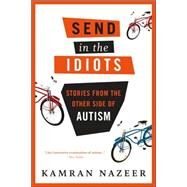$4.12
Description
In 1982, when he was four years old, Kamran Nazeer was enrolled in a special school alongside a dozen other children diagnosed with autism. Calling themselves the Idiots, these kids received care that was at the cutting edge of developmental psychology. Now a policy adviser in England, Kamran decides to visit four of his old classmates to find out the kind of lives that they are living now, how much theyve been able to overcomeand what remains missing. Bringing to life the texture of autistic lives and the limitations that the condition presents, Nazeer also relates the ways in which those can be eased over time, and with the right treatment.Using his own experiences to examine such topics as the difficulties of language, conversation as performance, and the politics of civility, Send in the Idiots is also a rare and provocative exploration of the way that peopleall peoplelearn to think and feel. Written with unmatched insight and striking personal testimony, Kamran Nazeers account is a stunning, invaluable, and utterly unique contribution to the literature of what makes us human. Kamran Nazeer was born of itinerant Pakistani parents and has lived in New York, Jeddah, Islamabad, and Glasgow. He studied law but decided not to become a lawyer. By the time he completed his Ph.D. thesis, he had decided not to become an academic. On leaving Cambridge, he was recruited into Her Majesty’s Service and works as a policy adviser in Whitehall. He has published work in U.K. newspapers and magazines. When he was four years old, Kamran Nazeer was enrolled in a small New York City school alongside a dozen other children diagnosed with autism. Calling themselves the Idiots, these kids received care that was at the cutting edge of developmental psychology. Two decades later, Nazeer undertook a mission to try and reconnect with four of his schoolmates. He wanted to understand what it meant to grow up with autismto see the many obstacles his classmates had cleared, and to understand the ones they couldn’t. A speechwriter unable to make eye contact; a messenger who gets upset if anyone touches his bicycle; a musically gifted but depressive pianist; and a computer engineer who communicates difficult emotions through the use of hand puppetsthese four classmates reveal an astonishing, through-provoking spectrum of behavior. Like all of us, each of them has his or her own set of fears and obsession, hopes and triumphs. Send in the Idiots is the candid, surprising, and moving tale of their lives. Using his own experiences to examine such topics as the difficulties of language, conversation as performance, and the politics of civility, Nazeer also gives us a rare and provocative exploration of the way that peopleall peoplelearn to think and feel. This is a brilliant look inside a world of outsidersa story not just of autistic children and their fate in the world, but of how all of us grow, grow apart, and sometimes even find out own way in the long journey from childhood to adulthood.Paul Collins, author of Sixpence House and Not Even Wrong The way certain portraits appear to be lit from within, this book has an inner radiance that is exhilarating. Kamran Nazeer is both witness and guide and adept at either role. I read to the end and began again at the beginning in order not to leave his company.Alec Wilkinson Nazeer, a successful British government policy adviser, was diagnosed early on with autism; he now seeks out the fate of four autistic classmates at his former New York City school. He first encountered the ‘idiots’ (as one of them called the group) more than 20 years ago, in an unnamed private school that has subsequently closed. In addition to interviewing the former pupils, all but one (who committed suicide) enjoying varying degrees of success in the greater world, Nazeer also visits the school’s former director and special-needs teacher to learn how teaching autistic students has evolved. Considered a neurobiological disorder, autism largely confines a child to his or her own mental world. Andr, for example, living in Boston with his sister, became a competent computer researcher and manages to mediate the challenges of ordinary conversation through the use of a puppet. Randall, a courier in Chicago, demonstrates how early ‘parallel’ play led to a satisfying love relationship (developing empathy is difficult for the autistic). Craig became an accomplished speechwriter until his awkward social skills derailed him, while Elizabeth immersed herself in playing the piano before withdrawing completely. Nazeer delicately interweaves his own story of being ‘cured’ for an enlightening journey through the unreachable mind.Publishers Weekly





